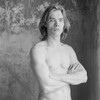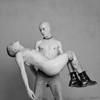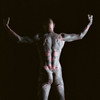Description Hide Description- Show Description+
I’ve never asked him, but Andreas Fux must have lived in his apartment in Prenzlauer Berg for a very long time. Top-floor, two rooms to the street out front, bathroom and kitchen facing the inner courtyard, and then a curious extension of the larger room into the building’s side wing. That’s where the darkroom is. It goes without saying that Andreas’ photography is analog; he develops his own negatives and does so with complete mastery. But that’s not all. There is no shortage of drama when developer, stop bath and fixer need to be ordered, delivered and put to use in these modern, digital times; not to mention getting hold of photographic paper and coming to terms with the particularities of each batch of photos. Analog takes time: all-nighters in the darkroom to produce the perfect prints; and finding the perfect shots takes at least as long.
In the large room, right next to the darkroom, is a wall that can be seen in a number of the photos in this book. In André’s photos from the early 90s we see it stripped of its wallpaper, revealing a charming detail of the economy of scarcity in the GDR: to save materials, the electric wiring was laid diagonally before plastering. At some point his place got renovated, the electrical sockets were modernized, and the walls were painted either white or black. With the passage of decades, black becomes the predominant color, serving as a backdrop for everything that happened between Andreas and Francesco, Hannes, Johannes, Nico, Nico’s brother, Paul, Sören and many others. An incomplete chronicle of Berlin nights; an intimate portrait of people who have nothing to hide. After all, people generally don’t have much to be ashamed of, least of all their nakedness. The room and the wall as the Garden of Eden. Or maybe just the setting before and after a night of clubbing in the city. Sins, original or otherwise — not to mention snakes and apples and all that other hokum — have been completely erased from this picture. Anyone posing for Andreas’ camera knows what to expect, and is at peace with himself, his body and his desires. Berlin club hedonism as the path to Elysium?
The photographs in this volume are more than just pictures of guys with piercings, tattoos and scars, who proudly and confidently pose for the camera and look like the kind of man our mothers warned us about. Fux’s protagonists are real Berlin bad boys, worlds apart from the smoothed-over, commercialized standards of gay photography. They are, so to speak, Berlin’s contribution to cultural history and offer testimony to a specific period in the city’s history and in the history of gay emancipation. It was a time of innocence, when ostentatio genitalium was an expression of both strength and vulnerability, when we could handle the freedom of an erection. I’m not afraid, or Fuck the world: feelings you might find distilled in a song by Eminem. Or in a photo by Andreas Fux.
Note: images include full frontal male nudity.
Andreas Fux grew up in East Berlin and began working in photography in the early 80s. In 1988, his first works were published in the legendary magazine Das Magazin. His photographic subjects at that time included the East German punk and youth scene. Since 1990, Andreas Fux has been a freelance photographer and has devoted himself to his own artistic projects. He is one of the most prominent representatives of the art-photography scene in Prenzlauer Berg, which documented the last decade of the GDR and the transition to a reunified Germany. Fux became known to a wider audience through the photo series Sweet Skin (1995–2005). The nude, body culture, and sexuality are themes that have shaped his art until today. Andreas Fux lives and works in Berlin.
Photographer: Andreas Fux
Hardcover Published 3 October 2022 128 pages







